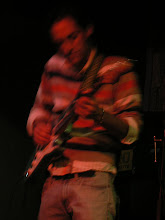Yugo took the stage. If a Japanese man could ever be the Blues, it would be Yugo. He donned a cowboy hat, cowboy boots, a beat up guitar from a bygone era, and a voice that sounded like too many years of solemn songs, broken relationships, and whiskey to wash it all away. He plugged in his beat-up acoustic guitar and played his own soulful renditions of Ray Charles tunes, mixing the jazzy harmonies with his own breed of intense strumming, a dynamic that I've seen among other Japanese guitarists. Dark, down home, earthy, folk-like, his music was good. No, his music was great. This was the Blues about as far away from it's roots as physically possible. This wasn't a Japanese bar at all. I was sitting on a porch in rural Alabama on a sticky summer afternoon, passing the time with slow, somber tunes and a bottle of Jack.

After his first set, Yugo approached me and introduced himself. From years of learning rural American songs and playing a few short tours in New York City as well as the deep South, his English was good. We talked about our different musical experiences and the Blues, and what it meant to us. One of his strongest influences is a modern yet obscure American bluesman who goes by the moniker Bob Log the III. Log's gimmick is his detuned slide guitar and microphone, a telephone fixed to his face on the visor of a pilot's helmet. His songs are wild, depraved, and perverse. Between thumping blues rhythms straight from the bayous of the Mississippi Delta, he sings about scotch, sex, tits, and slime. In a later set, Yugo would emulate this style by screaming through a mic attached to a gas mask stretched over his face.
Bob Log was probably the last name I ever expected to hear in Japan. Even at home, he is relatively little known. I'm familiar with Log's music through my brother, an obsessive collector of albums from Fat Possum Records, Log's label. I felt that perhaps we were the only two people in the entire city of Tokyo that knew this music, yet by some act of providence, we ended up in the same bar. And if my brother was here to join me, we would have been the only three people in the world.
Hugo was so enamored with Log's music that the two musicians even had contact over email some years back. I kept thinking about my older brother, who used to transcribe Bob Log's guitar riffs for hours. I was quick to exploit this coincidence of taste for talking points and our conversation quickly developed. I went from a strange foreigner to a welcome guest from abroad who could appreciate the music in question. The atmosphere of the bar was quick to become more inviting.
It was in the next set when the "Cyber Blues" truly began. Hugo switched instruments to a reissued classic jazz guitar that he had personally modded with a MIDI pickup, allowing him to simultaneously strum the guitar and control a computer synthesizer. For lack of effective catagorical words, Hugo's breed of "Cyber Blues" can only be described as some sort of Electro Avant Garde Noise rock crossed with solo Classic Blues. His rhythmic strumming is animated and busy, his vocals purposefully raspy, and his synthesizer accompanies the sound with all sorts of flashy electronic effects and synthesized instruments. The atmosphere was topped off with floor lighting that cast shadows throughout the room and a pulsing white strobe light used for his darker, eerie songs.


Most impressive was his rendition of Louis Armstrong's classic, "What a Wonderful World." Even with his growling vocals and the wash of electronic effects, he was still able to poignantly articulate the lyrics of the song, "I hear babies cry, I watch them grow... And I think to myself, what a wonderful world."





No comments:
Post a Comment